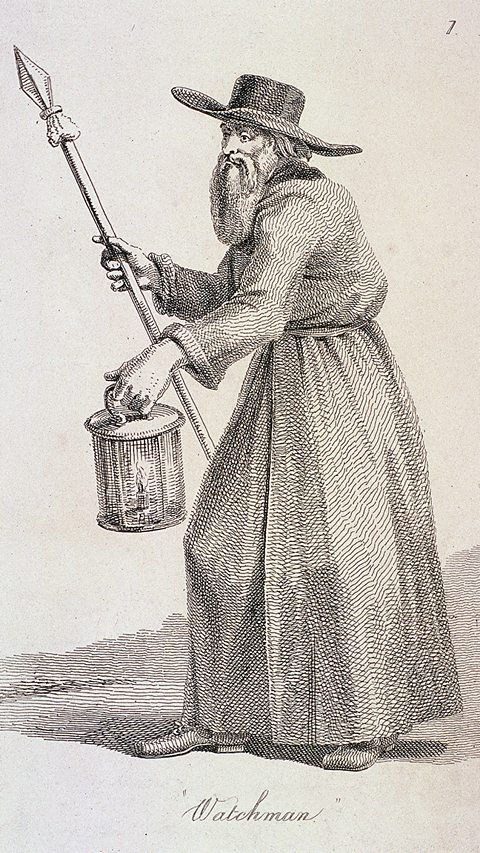Methods of law enforcement in early modern England
Some changes were made to improve law enforcement between c.1500 and c.1700. However, mostly there was continuity from the system used in medieval England.
Policing
Continuity
Policing still largely relied on the local community and so varied across towns:
- The hue and cryA method of raising the alarm to the rest of the village after a crime had been committed, usually by shouting loudly. continued to be used. Members of the local community, led by the constable, were expected to search for criminals. Witnesses were required to step in to stop suspects and/or report them to the authorities.
- A local posseA group of men, over the age of 21, summoned by a sheriff to assist in preserving the public peace and called upon in an emergency. was used to catch criminals.
- Parish constables were still used to protect citizens from crime. However, this was a part-time role without weapons or a uniform. Parish constables could arrest and punish criminals, including vagrantHomeless, unemployed person who wandered the streets. who were often whipped. Constables were also responsible for offenders held in prison before their trial.
Change

There were also some changes to policing in early modern England. These were largely made because the growth of towns brought with it new opportunities for criminals:
- Larger towns employed watchmen to patrol the streets between 22:00 and dawn. Watchmen carried a lamp and rang a bell to warn people to go home or risk being identified as criminals. They were also expected to arrest vagabonds and drunks. All watchmen were volunteers and unpaid.
- The town constable was appointed and employed by the town authorities. The constable was expected to turn serious criminals over to the courts, break up fights, round up vagrants, and collect community payments for road maintenance and cleaning.
- Ordinary people were given the power to deal with crime themselves. They could obtain an arrest warrantA certificate authorising an action. from a Justice of the Peace Someone responsible for maintaining law and order in a county. Often abbreviated to JP. (JPs) to catch the criminal and deliver them to the constable.
- Rewards were given for the arrest of criminals, often in the form of money.
- Wealthier householders joined together to hire armed guards to protect them and their families and property. These were early steps towards a paid police service.
- Constables and watchmen had limited success and lacked motivation to hunt down criminals effectively. Therefore, many people turned to professional thief takers to reclaim their stolen property. Thief takers were paid a percentage of their recovered ãbootyã and delivered criminals to the authorities. This system was open to corruption as criminals were sometimes thief takers too.
Jonathan Wild
The most well-known watchman was Jonathan Wild, who worked in London. In 1718 he called himself the Thief-Taker General. However, his own criminal activities were discovered in 1725 and he was executed for his deception.
Trials
Continuity
Some features of trials continued from medieval England. Most trials still took place at a local level:
- Although JPs had been introduced in medieval England, they took on a greater role in early modern England. JPs were helped by the constable and judged manor court cases for crimes that had been committed on the land of the lord of the manor. This enabled them to hand out community punishments, such as fines, stocksA wooden frame with holes to hold the feet of someone convicted of a crime.pilloryA wooden frame with holes to hold the head and hands of someone convicted of a crime. and whipping.
- Manor courts continued to deal with local and minor crimes such as drunkenness.
- Royal judges still visited each county twice a year to judge the most serious offences. These became known as county assizes.
- Church courts continued to be used to judge churchmen and those who could claim benefit of the clergy.
Change
However, there were some changes that improved the system:
- Four times a year, JPs would meet with other JPs from across England at quarter sessions. Here they would judge more serious cases of crime and had the power to sentence an offender to death.
- By 1600, more people could read and were able to claim benefit of the clergy using the ãneck verseã - where a verse from the Bible was read to prove their connection to the Church. This led to a change in the law preventing anyone from using benefit of the clergy for serious crimes.
- The Habeas Corpus Act was passed in 1679. This prevented the authorities from imprisoning anyone indefinitely without charging them with a crime. Those who were arrested had to appear in court, within a certain time, to stand trial or be released. Habeas corpus is still in effect today.